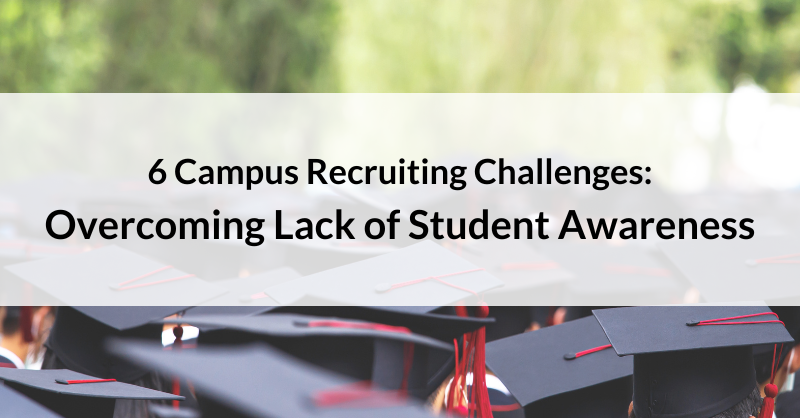.png)
6 Top Campus Recruiting Challenges—and How to Solve Them
In this series, we outline six of the top campus recruiting challenges and how Micro-Internships support employers in overcoming them. With the ever-evolving landscape of campus recruitment, it's essential for recruiters to adapt and find innovative solutions to attract top talent. Micro-Internships offer a fresh approach that addresses the specific pain points faced by recruiters and provides effective strategies to overcome them. Access the full eBook here.
1. Overcoming Lack of Student Awareness
In a sea of technology giants, startups, and big-name brands, it can be challenging for employers—especially ones that are not widely recognized—to stand out to college students. While so many of these companies have no shortage of early-career opportunities, they often struggle to attract the attention of talented career launchers—whether the reason is lack of brand awareness or preconceived notions held by students. If you’re a campus recruiter looking for strategies to overcome this challenge, this article is for you!
2. Achieving DEI Goals
In a post-COVID world, meaningful diversity, equity, and inclusion initiatives have become even more critical. Still, many organizations face internal obstacles when it comes to attracting and retaining diverse talent. This is where Micro-Internships come into play—enabling companies to create sustainable and equitable pathways that reach candidates while overcoming internal hurdles. Check out this article to learn how Micro-Internships help companies make measurable impacts on their DEI goals.
3. Leveraging Effective Hiring Signals
In lieu of relying on traditional hiring signals (many of which have been proven to be ineffective predictors of success) and time-consuming methods, Micro-Internships help employers assess potential employees—and in turn, allow candidates to evaluate their potential employer. Here’s how.
4. Building Genuine Candidate Relationships
If you’re a recruiter, you’re likely juggling tons of responsibilities while seeking top candidates to drive your organization forward. And if you’re operating by the traditional recruiting playbook, you probably know that the time constraints of traditional career fairs and interviews often leave little room for meaningful connections between recruiters and candidates. So how can you create opportunities for genuine engagement, build authentic candidate relationships, and foster lasting connections with future hires? Read on to find out.
5. Supporting Busy Hiring Managers
Hiring managers are constantly managing tons of moving pieces: recruitment responsibilities, resource constraints, and strategic decision-making, to name a few. When it comes to engaging talent for roles of any length, Micro-Internships serve an effective tool to support busy hiring managers.
6. Recruiting with Limited Resources
When you’re working with a lean recruiting team, a tight budget, or a jammed schedule that doesn’t leave much time for campus recruiting, it’s even more crucial to cut through the noise and stand out to high-potential talent. Unlike more traditional recruiting methods, Micro-Internships can help teams with even the leanest of resources build relationships with candidates and recruit more efficiently.
Learn how Micro-Internships can help you overcome campus recruiting challenges!


.png)
.png)
